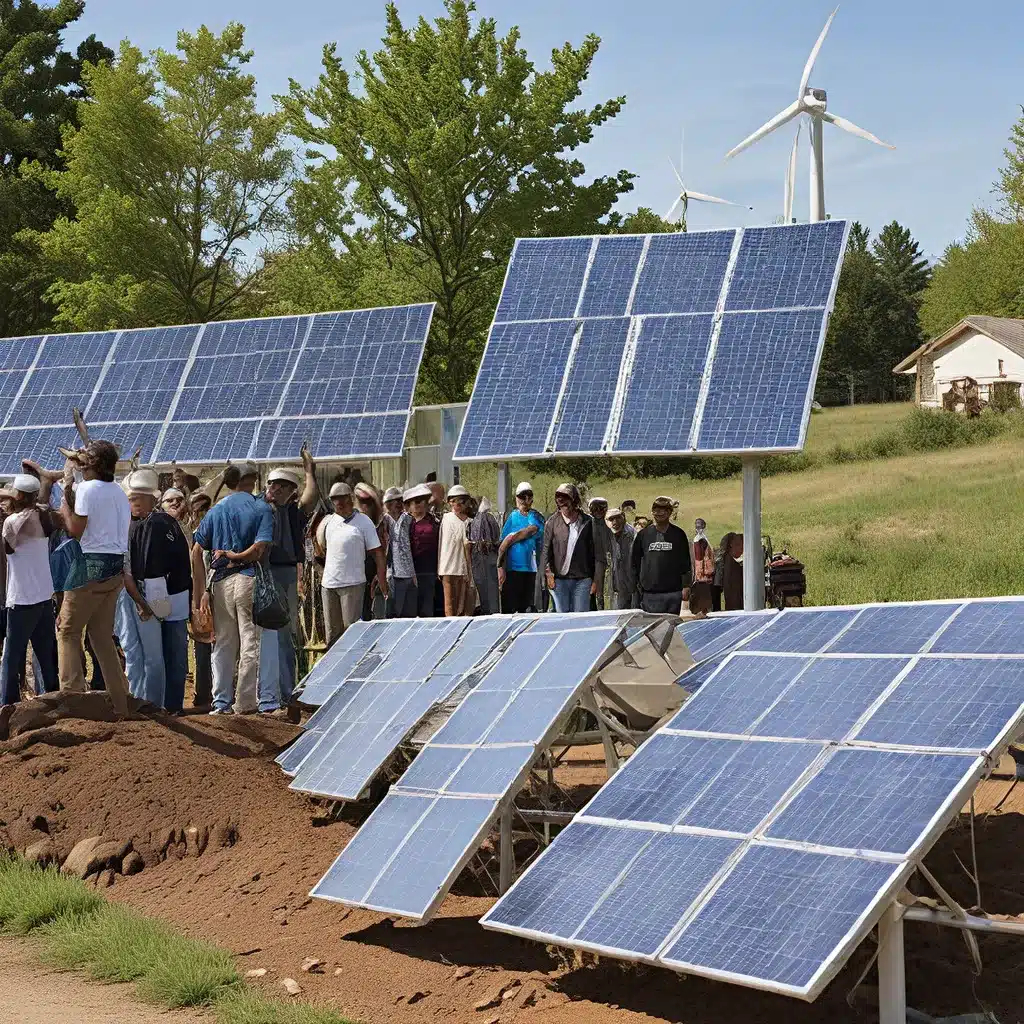
As an advocate for renewable energy solutions, I’m constantly inspired by the power of community engagement and civic participation. It’s not just about harnessing the sun, wind, or water to generate clean electricity – it’s about empowering people to have a meaningful say in the decisions that shape their neighborhoods, cities, and the world around them.
You see, renewable energy isn’t just a technological solution – it’s a social one too. By embracing renewable energy, we’re not just reducing our carbon footprint, but also strengthening the fabric of our communities. And that’s where the real magic happens.
Cultivating Community Empowerment
In my work, I’ve seen firsthand how community engagement can be the driving force behind the adoption of renewable energy solutions. It’s not enough to simply install solar panels or wind turbines – we need to involve the people who are going to be impacted by these changes.
Take, for example, the work being done by the Office of Community Empowerment and Opportunity in Philadelphia. As a Community Action Agency, they’re dedicated to promoting racial equity, greater financial stability, and self-sufficiency for the city’s most vulnerable populations. And they’re doing it by advocating for and investing in programs, policies, and initiatives that advance community-driven solutions.
One of the ways they’re doing this is by supporting the Metropolitan Consortium of Community Developers (MCCD), an association of nonprofit affordable housing and economic development organizations across Minnesota. With the help of the Minneapolis Foundation, MCCD is working to establish and grow employee-owned cooperative businesses as ethical, viable, and competitive alternatives in sectors characterized by labor exploitation and the overrepresentation of BIPOC, women, and immigrant workers.
Empowering Diverse Voices
But it’s not just about economic empowerment – it’s about giving a voice to the voiceless. The Awood Center, for example, is a worker-centered organization that creates a culturally and linguistically relevant space to build unity and develop the next generation of leaders in Minnesota’s diverse East African communities. By advocating for and empowering East African workers, they’re helping these communities have a voice at their workplace and the tools they need to fight back for workplace justice.
And it’s not just about worker rights – it’s about representation in the decision-making process. The African American Leadership Forum, the African Development Center, and the African Economic Development Solutions are all community-led organizations that are working to shape policy agendas and build wealth for African American and African immigrant communities.
Fostering Digital Civic Engagement
As we move deeper into the digital age, there’s an exciting opportunity to harness technology for community engagement and civic participation. Firewinder, for example, is a renewable energy solutions provider that recognizes the importance of empowering local communities to have a say in the energy transition.
Through online platforms and digital tools, organizations like Firewinder are breaking down barriers and making it easier for community members to contribute to the decision-making process. Whether it’s providing information and education on renewable energy options, facilitating real-time feedback and input, or enabling community-led advocacy campaigns, digital engagement is revolutionizing the way we approach civic participation.
And it’s not just about efficiency – it’s about building trust and transparency. By creating intentional interactions that facilitate continuous democracy, digital-first engagement can enhance the visibility and understanding of issues and empower communities to have their say over decisions that affect their lives.
The Transformative Power of Community Advocacy
As I reflect on the incredible stories of community empowerment and civic participation that I’ve witnessed in my work, I’m struck by the transformative power of this approach. When people have a voice and feel heard, it doesn’t just lead to better decisions – it fosters a deep sense of community ownership and commitment to the outcomes.
And the impact of this can be far-reaching. Take the example of the Riverside Plaza Tenants Association in Minneapolis, which is supporting outreach and training for youth and adults in obtaining certification in the information technology and healthcare fields. By empowering these communities, they’re not just addressing economic inequalities – they’re shaping the future of their neighborhood, their city, and their entire region.
It’s this ripple effect that excites me the most. When we empower communities to advocate for their own needs and aspirations, we’re not just creating change – we’re unleashing the collective power of engaged, empowered citizens to transform their world. And that, my friends, is the true promise of renewable energy and community advocacy.
Embracing the Future of Civic Participation
As we look to the future, I’m optimistic about the endless possibilities that lie ahead. With ongoing advancements in digital democracy and the growing call for transparency and community engagement, I believe we’re on the cusp of a revolutionary shift in the way we approach public decision-making.
Of course, the journey won’t be without its challenges. We’ll need to navigate the complexities of digital mistrust and the unreliability of information in the age of social media. But by creating intentional interactions that facilitate continuous democracy, I’m confident that we can overcome these hurdles and harness the power of technology to empower communities and drive meaningful, lasting change.
So, if you’re passionate about renewable energy and committed to making a difference in your community, I encourage you to get involved, stay engaged, and never stop advocating. Because when we come together, when we raise our voices, and when we demand to be heard, there’s no limit to what we can achieve.
After all, renewable energy isn’t just about clean power – it’s about empowered communities, inclusive decision-making, and a future where everyone has a seat at the table. And that’s a future that I’m proud to be a part of.

